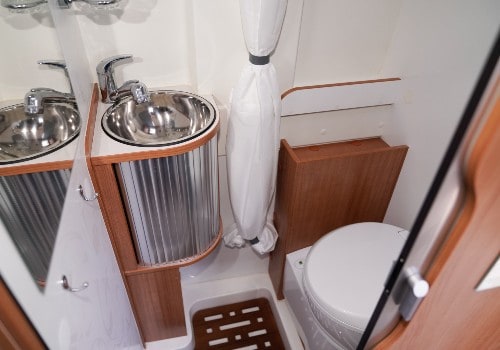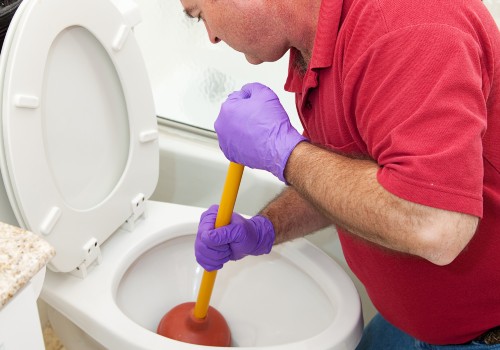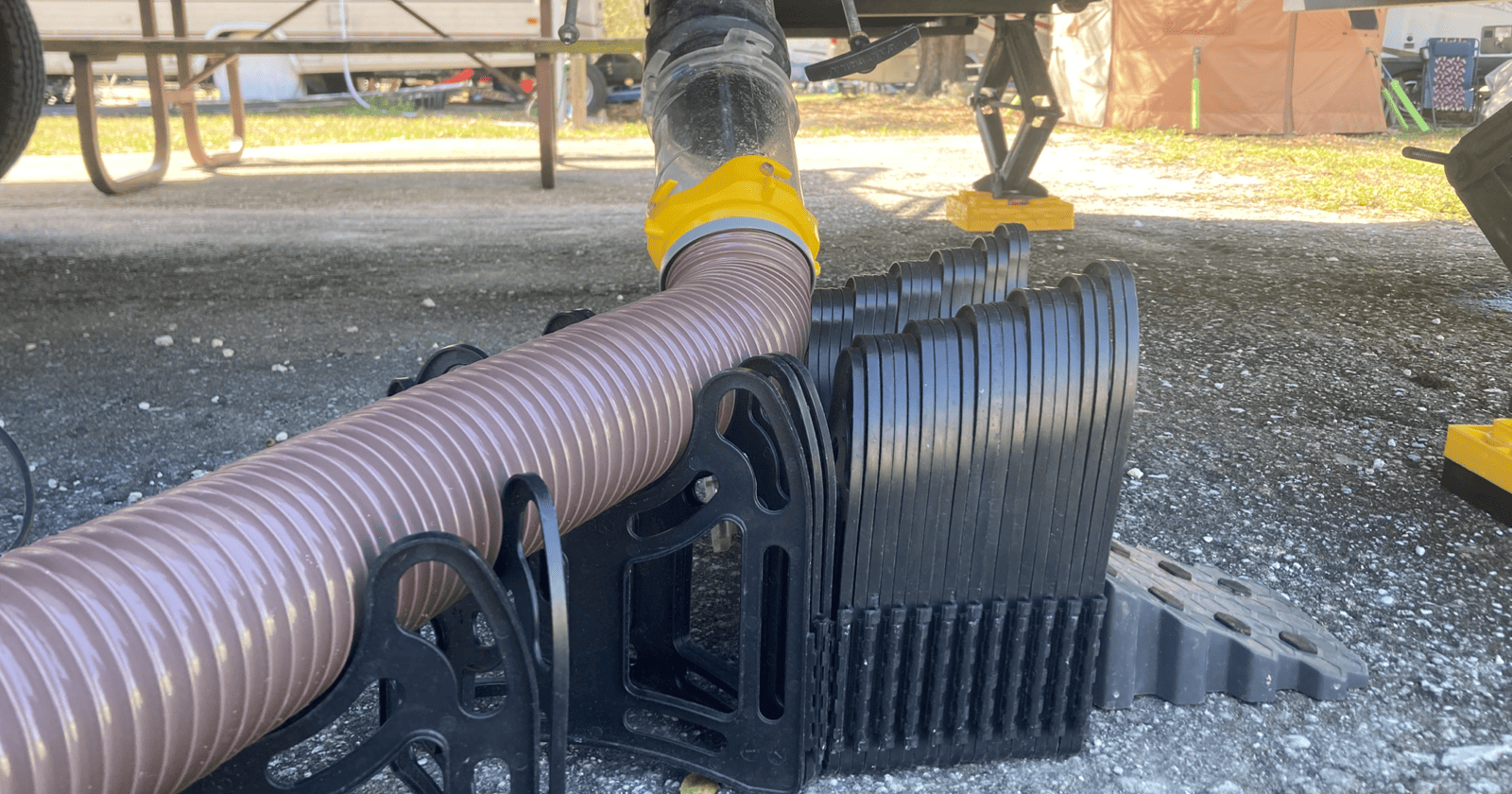The black water tank system in your RV is one of those technologies most people don’t want to know the details about. As long as they can flush their toilet and cleanly dump their wastewater, they’re happy. When their RV toilet clogged up, they felt helpless to correct the situation.
Do not use Draino, acidic products, or other household drain cleaner products in your toilet or other RV plumbing.
These chemicals are too harsh for your RV’s plumbing. Not only will you not fix your clog, you’ll end up having to replace your toilet’s plumbing. Our discussion will show you how clogs happen, how to safely fix them, and the best tips to prevent blockages.
Signs That You Have a Toilet Problem

When your toilet works properly, your treatment chemical and various flaps in the plumbing prevent odors from seeping up from the holding tank. If you’re starting to smell a medium to strong bathroom odor, this is an indicator that you may have a black tank clog.
Another sign you have a toilet problem happens when you’re draining your black holding tank. If your tank isn’t draining or slow, there could be a blockage somewhere. Veteran RVers like to use clear plastic sewer hose adapters so they can monitor the flow, or listen for good flow.
The best indicator is the toilet backing up. This is the most common issue. There are some simple fixes to solve these clog problems you can do yourself.
You Know Your Toilet is Clogged. Now What?
Now that you know your toilet’s clogged, don’t do anything that could make it worse. If someone needs to use the facilities, this is a good time to check out the campground’s bathhouse or “commune with nature.” If you’re combining your grey and blackwater tanks, don’t continue to add any greywater since that’ll make the problem worse.
Understand the Problem
Your RV’s toilet is very different than your household commode. House versions use strong water pressure to push waste down to the sewage system. The pipes are either metal or thick polyvinyl chloride (PVC) plastic that’s very durable.
Your RV’s system is gravity-based. The water that enters the commode bowl mixes with the waste. Your RV’s sewer piping uses acrylonitrile butadiene styrene (ABS) pipes which is less durable than PVC.
The water that flushes with your waste keeps it slick enough to make the journey to your black tank. To help things along, these pipes have a smooth interior. They’re angled in a downward slope to keep things moving.
Home and commercial plumbing break down sewage once you flush the toilet. Your RV breaks everything down in the black water tank relying solely on the treatment chemicals you use. If it doesn’t break down correctly, the solid material won’t drain out.
If the black tank leaks or isn’t emptied regularly, the loose solid material can reform into a hard solid mass that can create a blockage. This material builds up on your sensors making your black tank readings inaccurate. This is why you should dump your black tank weekly on long trips.
The enzymes can only do so much. Using toilet paper not made for RVs or throwing non-bathroom related things down your toilet can be disastrous. These other objects won’t break down and can become the nucleus for the solid matter to bond to. This can result in building into a clog down the road.
What You Will Need to Unclog Your Toilet

As we mentioned above, and we can’t stress this enough, don’t use household drain cleaners. There are a few safe methods you can use that don’t require chemicals. If you don’t have these items already, they’re easy and inexpensive to pick up anywhere:
- A plunger
- A hose that will connect to your bathroom sink
- A five-gallon bucket
- Clothing you don’t mind discarding
- Rubber boots
- Rubber gloves/latex gloves
- A flexible plumber’s snake
- Protective eyewear (if you wear glasses, goggles that fit over them)
- A medical face mask
- A long shower afterwards
- Proceed With Caution
Some of these methods you can do on your own. Others require another person. When using the methods with another person, be gentle to avoid blasting them with an unwanted surprise
How to Clear the Waste Matter From Your RV’s Tank
This technique will help you clean out your RV blackwater holding tank if it’s partially or completely clogged. It’s a good idea to hook up your sewer hose and try draining out what you can ahead of time. Once complete, follow these steps:
Prepare yourselves with your discardable clothing and personal protective gear
Place the bucket directly under your sewer opening
When you’re ready, one of you open the black water tank valve
Work the flexible snake into the black water tank
Keep doing this until you start getting flow. Make sure you get out of the way to keep yourselves sanitary
After a few attempts, if the clog doesn’t clear out, its time to call a professional.
If you need to call a professional, contact your RV dealer or repair shop for recommendations. Not all plumbers have experience with the inner workings of any RV. The differences between an RV and a structural plumbing system are too numerous for guesswork.
How to Unclog an RV Toilet

If the clog exists near the toilet, there are a number of things you can do. You can do these yourself. Any one of these techniques has proven to be effective by fellow RVers:
Use a plunger: If the RV toilet keeps clogging, it could simply be a build-up in the toilet pipe. If the waste backs up into the toilet’s bowl, the weight of the water and the suction the plunger creates could be everything you need to clear the blockage. This could be the best 99 cents you’ll ever spend.
RV toilet snake: We showed you what to do if your RV black tank is clogged with toilet paper or other materials. You can use the RV toilet snake down the toilet to clear blockages if a plunger doesn’t work. Use the same method above by working it down and around the sides to clean the RV toilet tube.
Use a macerator pump: Sometimes gravity isn’t enough. Using a macerator pump creates a vacuum that pulls all of the waste from your black tank. It churns up the materials similar to a kitchen sink’s garbage disposal.
Use dish soap: Every experienced RVer knows the value of dish soap. In this case, pouring dish soap down your toilet can grease up and loosen the clog. You’ll want to let the soap sit for at least an hour to give it time to work its way around the blockage.
Take a drive with ice: You can fix your RV toilet clog and alleviate your need to drive your coach at the same time. If you stop at a gas station or convenience store, pick up a back of ice, and fill your toilet with about half of the bag. Flush the ice down the toilet without water, and drive for an hour.
The road vibration will agitate the ice well enough to knock the clog loose. This is also a great technique to clean your black tank sensors. The ice melts down to make dumping easy.
Hot water: If cold ice doesn’t work, go hot. Use your coffee or tea maker to pour hot water down your toilet. After about an hour, the hot water should loosen the clog. Your RV’s plumbing and black water tank can withstand temperatures much higher, so you don’t have to worry about melting issues.
Avoid Unclogging an RV Toilet With These Simple Tricks
To avoid unclogging your RV toilet, there are many things you can do. As we mentioned before, limit what goes down your toilet to human waste and toilet paper made for your RV. This type of toilet paper breaks down in your black tank.
Add RV toilet treatment after you dump your black water tank. It prevents odors and adds enzymes that breakdown solid matter. If you’re dumping your tank at home into your septic system, make sure you use the bio versions instead of the blue chemicals to maintain the septic’s ecosystem.
The Best Fix for Unclogged Toilets
Regular preventive maintenance is the best way to unclog your RV water lines. As the saying goes, “the best way to avoid a problem is to prevent one.” These simple steps can keep your black water issues clean and sanitary.
Dump your black water tank after every trip or weekly on a longer trip. It’s recommended that you flush out your tank every 1 or 2 months. This prevents the build-up of solid material and will keep your sensors from reading inaccurately.
If your RV doesn’t have a black tank flush system, there are many ways to sanitize your holding tanks or install a flush system. This not only prevents clogs, but it also extends the life of your sewer system. The last thing any RVer wants is to give up a trip because they have to repair their toilet system.
What is a Black Tank Flush System
Newer towable and motorhomes now come with black tank flush systems from the factory. Some are standard features, others offer them as optional equipment. Many in the RV community don’t understand how they work or their importance.
Essentially, the flush system is a lawn sprinkler built inside the black tank. When you connect a city water hose to it (the connection is usually in or near the utility bay), the water pressure from the hose spins the head. This sprays water throughout the tank with some water pressure behind it.
This medium-pressured water will knock loose any solid material build-up. When you use your black water flush system, make sure you have your sewer hose connected and the valve open. If you have your tank closed, the pressure could crack the seals of the tank.
The best way to use the system is to run it for five minutes. There’s nothing wrong with running it longer. You can pour a black tank cleaning treatment down your toilet and then run the flush system to enhance the cleaning.




